Преступление и наказание — тема, которая волнует умы людей во все времена. В этом уроке студенты погрузятся в мир правосудия и будут обдумывать, как разные виды наказаний отражают отношение общества к преступлениям.
Что лучше работает: крупный штраф или общественное порицание? Может ли стыд быть более действенным, чем тюремный срок? Какие наказания кажутся нам гуманными, а какие — устаревшими и жестокими?
В этом уроке студенты не только узнают новые слова и грамматические конструкции, но и обсудят реальные истории, поразмышляют о целях наказания и попробуют придумать свои оригинальные меры воздействия на мелких нарушителей.
1. Match the following punishments to the definitions on the right:
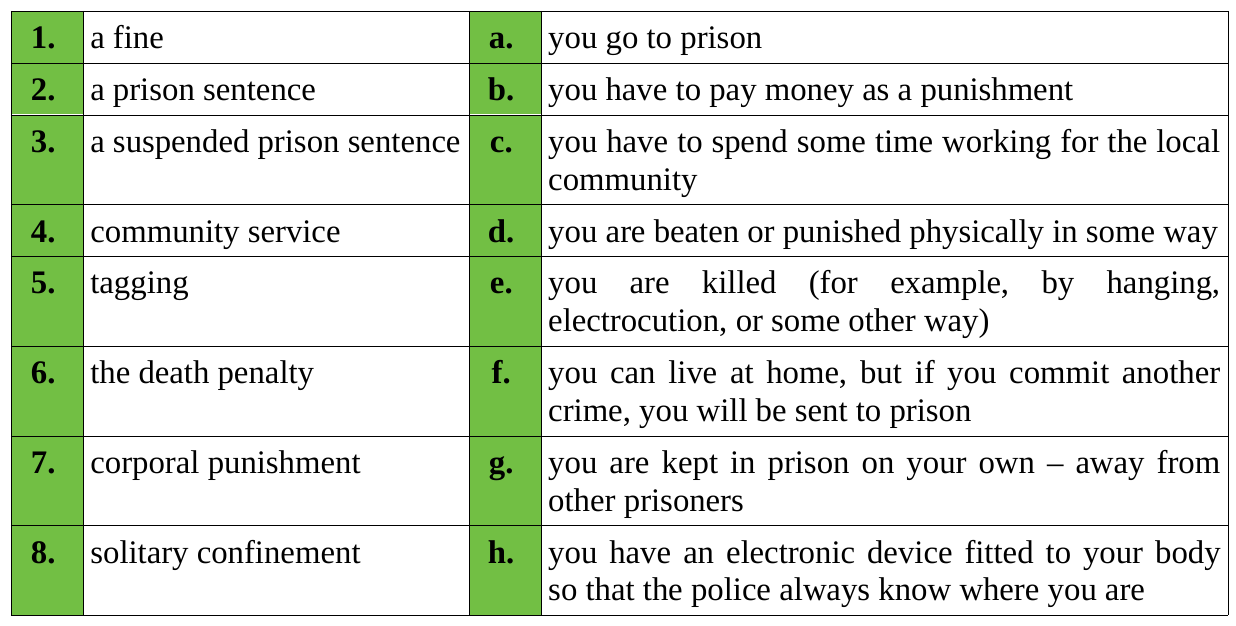
Get into pairs and discuss the following questions:
- Which of the above punishments are used in your country?
- What other punishments are used?
- What is the reasoning behind each different type of punishment?
- Which punishment is the most effective? Which is the least effective?
2. Read the article below and then answer these questions:
- What sentences were given for a) shoplifting b) drunk driving?
- What does one woman think are the benefits of these sentences?
LET THE PUNISHMENT FIT THE CRIME
In a number of courts in the US ‘naming and shaming’ is working. If you are found guilty of shoplifting, you may expect a fine or a short prison sentence, but you might actually receive a totally different punishment. You could have to spend a couple of weeks walking up and down the street outside the store you stole from, carrying a sign that reads: “I am a thief. Do not steal! This could be you.”
This somewhat eccentric sentencing policy has an effect. Consider the drunk driver forced to confront the consequences of his actions every week for five years. His sentence was to write a one-dollar cheque every Friday to the man whose daughter he ran over. At the bottom of each cheque he had to write ‘For causing the death of your daughter.’ Shamed offenders often do not like their sentences – and that is the point. ‘Shame makes you stop and think,’ says a woman with a recent conviction for theft. ‘It gave me humility, which helped me. And if other people see the sign, maybe they’ll think twice before they commit a crime.’ The only question is: how far will we go down this road? Will each town revive its public stocks? Will we soon be going along to throw tomatoes and rotten eggs at convicted criminals? And is this a step forward or a step back?
3. Work in pairs or small groups. Look at these statements about the article you read. Decide if you agree or disagree.
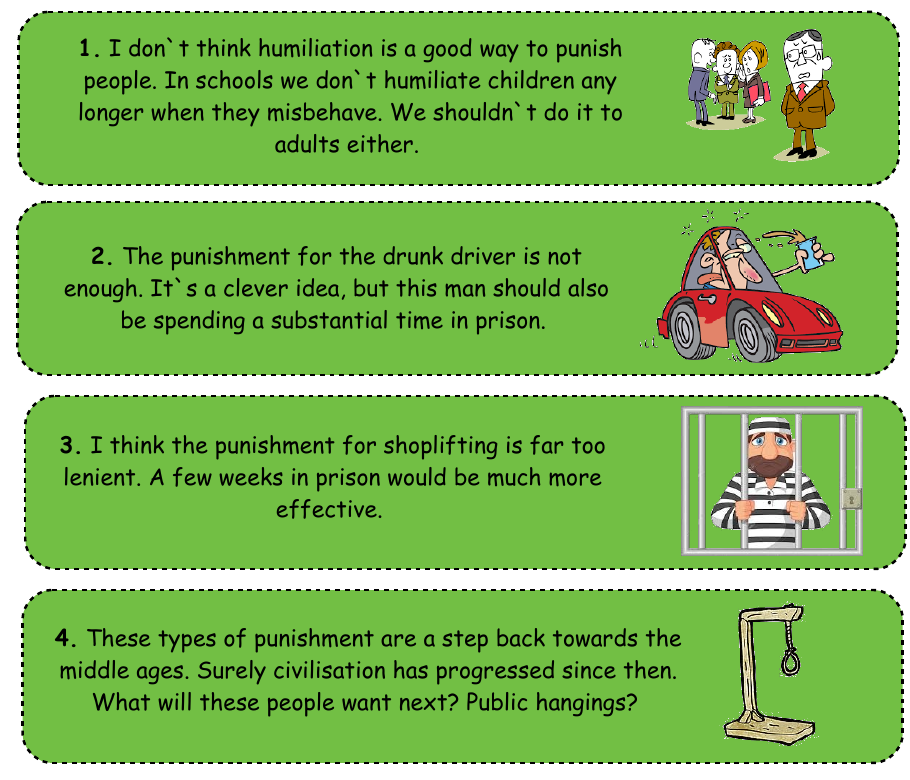
4. Read the rules below.
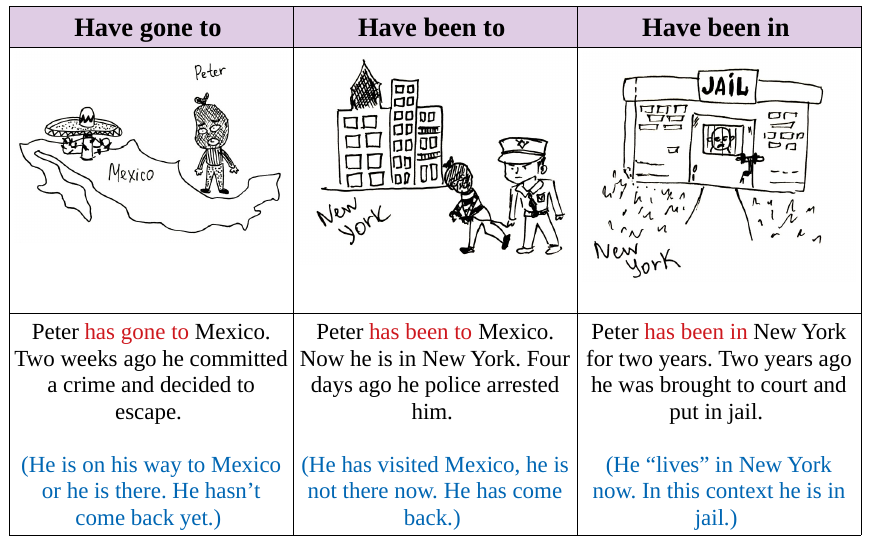
Work in pairs. Make up three situations of your own where you should use have been to, have been in and have gone to. If it is possible, the topic of your situations should be related to crime. Do not forget to make drawings.

5. Read the rules below.
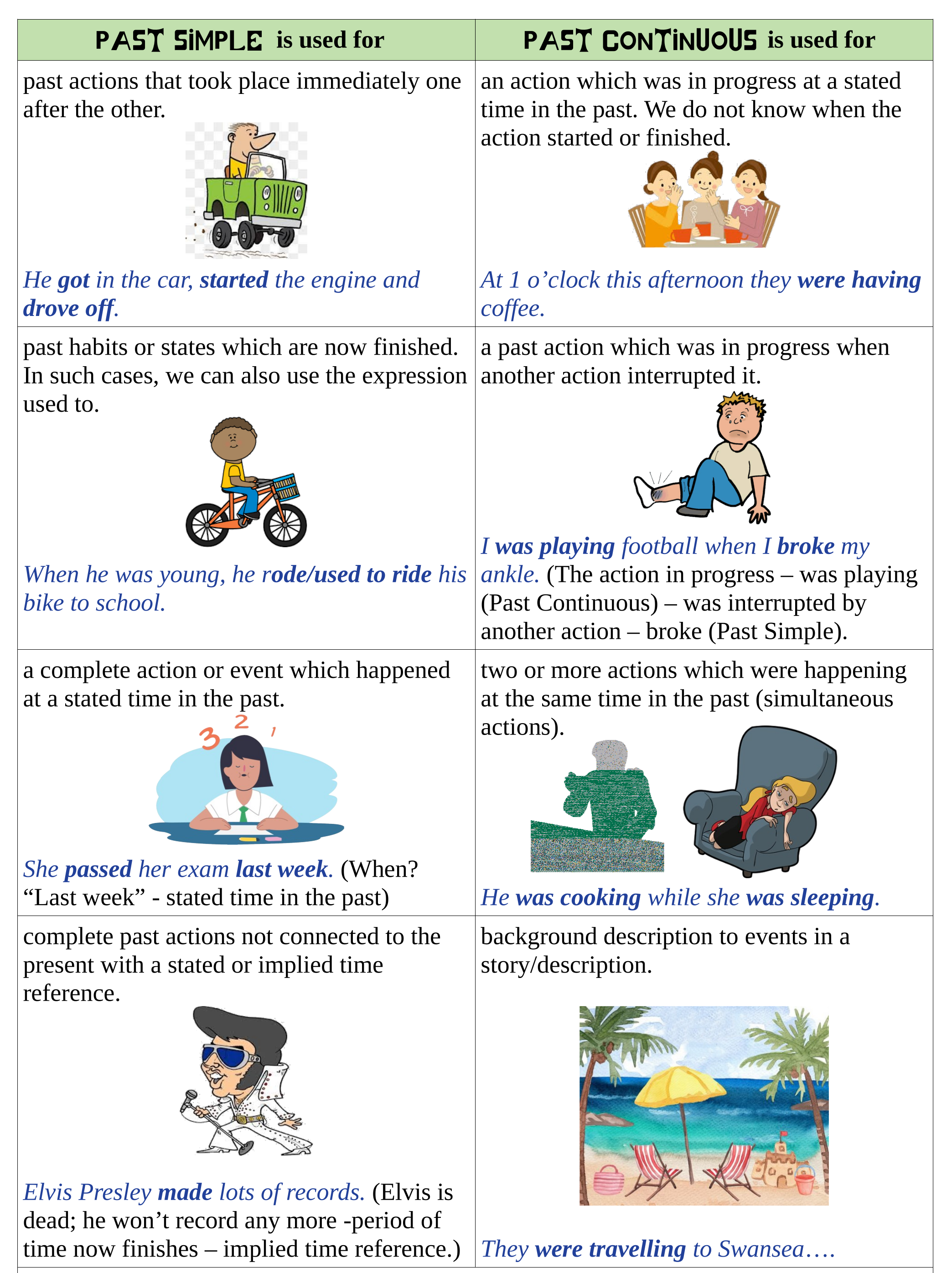
We often use the Past Simple in a narrative (e.g. a report or a story) to talk about a single complete past event and the Past Continuous to describe the situation that existed at the time. The event might have interrupted the situation, or happened while the situation was in progress.
Erika dropped her bag while she was getting into her car.
She was shaking with anger as she left the hotel.
Complete the following sentences with the Past Simple or Past Continuous forms. Where alternatives are possible, use both options.
I …………………… (buy) a new alarm clock the other day in a jewellery store, when I actually …………………. (see) somebody shoplifting. I’d just finished paying for my clock and as I ……….………….. (turn) around, an elderly woman ………………… (slowly put) a silver plate into a bag that she ………….……….….. (carry). Then she …..……..…….… (walk) over to another part of the shop and …..……..……….. (pick up) an expensive-looking watch a number of times. When she …………..….. (think) that nobody ..………….. (look), she ………………….. (drop) it into the bag. Before I ..………….……… (have) a chance to tell the staff in the shop, she ……..……….……. (notice) that I …………………. (watch) her and ……….……….. (hurry) out. Unfortunately for her, two police officers ………………… (walk) past just at that moment and she ..………….…… (run) straight into them.
6. Complete the text below using appropriate forms of the words and phrases in the box.

Darren Jackson, 31, of Oxford Road, Abingdon was 1) ................................….. yesterday of 2) .........................……. Abigail Hunt while driving under the influence of drink. Judge Barbara Mowat 3) ...….....................… Mr Jackson to a £1000 4) ..............……… and three years in 5) .........................…. saying: “You have 6) ............………… a very serious crime. And what is worse, you have a previous, similar 7) ..........................…… . You may think you are unlucky. I think you are a shameless 8) ......................……. . I am giving you a harsh sentence in the hope that it will be a warning to other potential 9) .......................… .
7. In an effort to stop petty crime, your government wants to develop a new and radical system of punishments for dealing with minor criminals. Work in pairs or small groups and devise suitably imaginative punishments for people who:
- steal stationery and pens from their employer
- break the speed limit when driving
- leave a restaurant without paying the bill
- pick pockets
- park illegally
- steal mobile phones
For example:
People who steal mobile phones should:
-be made to work in a call centre for two years.
-spend one day a week for a year cleaning public phone boxes.
-be fitted with an electronic device that blocks mobile phone signals for a distance of ten metres from the wearer.
Compare your answers with other pairs/groups.
Homework
Investigate the crime.
Many people are strongly convinced that Sergei Yesenin couldn’t have voluntarily died. It would have been too trivial and unethical for a legendary poet to leave this world by hanging himself. So, was he actually killed? Or did he commit suicide? Look at the pictures of Yesenin’s death scene and write a short text stating your opinion on what happened to the great Russian poet. Use the forms of Past Simple and Past Continuous.

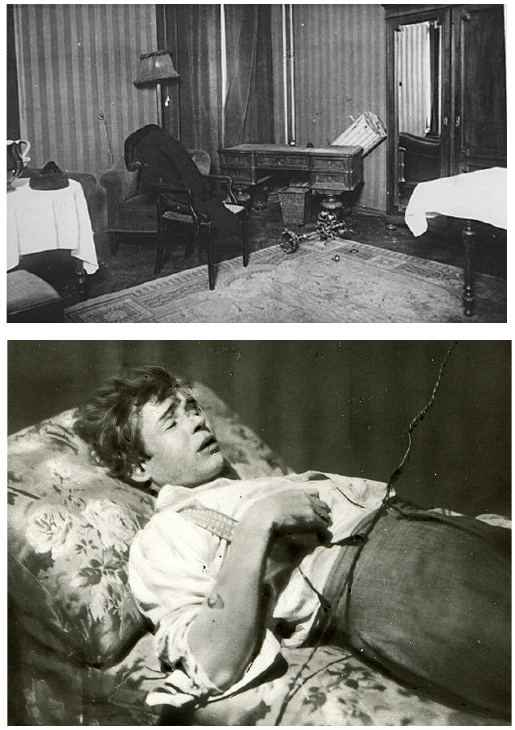
Vocabulary from this lesson
naming and shaming — навешивание ярлыков и клеймение позором, предание гласности и позору
prison sentence — тюремное заключение
suspended prison sentence — лишение свободы условно
community service — общественные работы
death penalty — смертная казнь
corporal punishment — телесное наказание
solitary confinement — одиночное заключение
reasoning behind smth — обоснование, аргументация
to find smb guilty — признать кого-то виновным
shoplifting — магазинные кражи
eccentric — странный
sentencing policy — карательная политика
to confront — сталкиваться (с чем-то трудным), признавать, смотреть фактам в лицо
to run smb over — задавить, переехать кого-то
offender — правонарушитель, преступник
conviction — признание виновным
humility — скромность
to commit a crime — совершить преступление
to go down this/that road — наступать на те же самые грабли
to revive — восстанавливать
public stocks — государственные ценные бумаги
rotten eggs — тухлые яйца
a step forward — шаг вперёд
a step back — шаг назад
humiliation — унижение
to humiliate — унижать
substantial — существенный, значительный
lenient — мягкий, снисходительный
middle ages — средние века
public hanging — публичное повешение
to bring to court — привлекать к судебной ответственности
harsh sentence — суровое наказание, суровый приговор
stationery — канцелярские принадлежности
minor criminals — 1) мелкие преступники 2) несовершеннолетние преступники
to pick pockets — воровать по карманам
to convince — убеждать
trivial — незначительный
unethical — неэтичный
to commit suicide — совершить самоубийство
